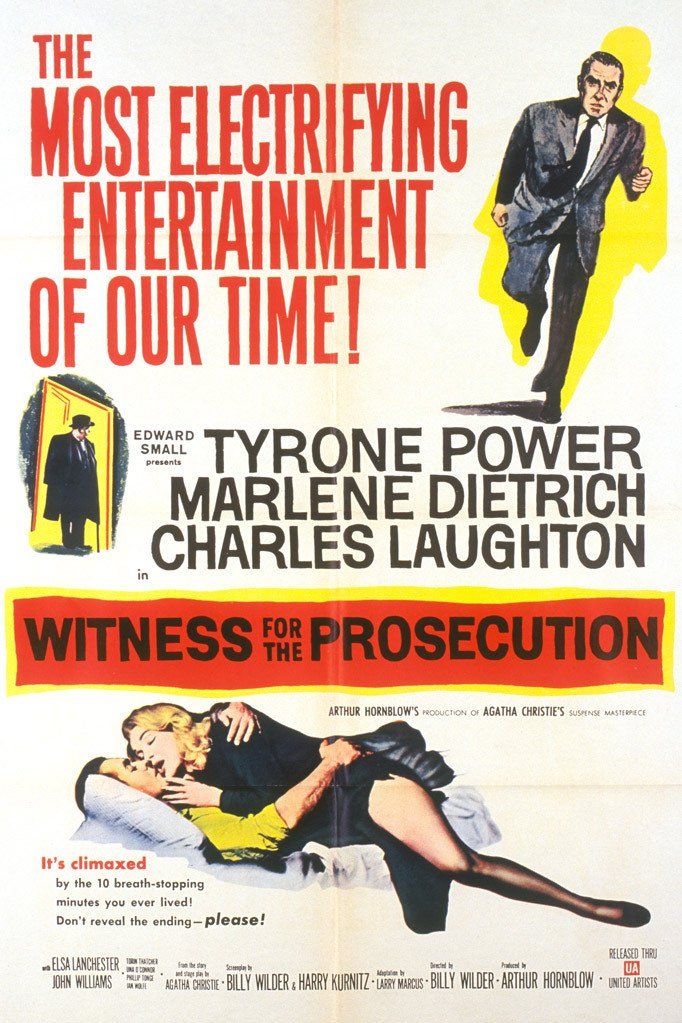Catch up on the series and find new installments daily here.
__________________________________
Witness for the Prosecution (1957)
__________________________________
TYPE OF FILM: Courtroom
STUDIO: United Artists
PRODUCER: Arthur Hornblow
DIRECTOR: Billy Wilder
SCREENWRITERS: Billy Wilder and Harry Kurnitz; adapted by Larry Marcus
SOURCE: Witness for the Prosecution, short story and play by Agatha Christie
RUNNING TIME: 114 minutes
PRINCIPAL PLAYERS:
Marlene Dietrich…………………………………………………………………….Christine Vole
Tyrone Power…………………………………………………………………..…….Leonard Vole
Charles Laughton………………………………………………………………Sir Wilfrid Robarts
Elsa Lanchester…………………………………………………………………..…..Miss Plimsoll
John Williams……………………………………………………………………….Brogan-Moore
Henry Daniell………………………………………………………………………….…..Mayhew
Una O’Connor……………………………………………………………………..Janet McKenzie
Ian Wolfe……………………………………………………………………………………..Carter
Torin Thatcher………………………………………………………………………….…….Judge
__________________________________
DID YOU KNOW?
__________________________________
Being too good an actress in Witness for the Prosecution probably cost Marlene Dietrich an Academy Award nomination. Although famous for her sultry singing voice and gorgeous legs, Dietrich never made anyone’s top ten list for the best actress in Hollywood. She had always been offered a limited choice of roles—the femme fatale—and she yearned to prove that she had a greater range than that, so she desperately wanted the part of Christina Vole. Director Billy Wilder obliged her. She helped develop a plot in which it was vital that she wear a disguise good enough to fool their barrister. Dietrich played the part of the cockney tart to perfection, fooling both the film barrister and audiences. She played it so well, in fact, that critics and Hollywood insiders refused to believe she was good enough to have actually played both roles. However, Elsa Lanchester, the nurse in the film and Charles Laughton’s wife in real life, spoke freely about how often Dietrich showed up at the couple’s house to borrow appropriate clothing and study a cockney accent with the accomplished Laughton. There are even production stills showing Dietrich, without makeup, rehearsing the role. When Academy Award time came, however, Dietrich was one of the few principals who did not receive a nomination. She was defeated on two fronts: First, the rumor that she did not play both parts persisted, casting enough doubt that the members of the Academy were reluctant to vote for her. Second, an aura of secrecy about the film prevailed, with the studio’s entire publicity campaign focused on asking viewers not to reveal the stunning twists in the plot. Therefore, Dietrich’s dual role went unknown by all except those who had actually seen the picture.
__________________________________
THE STORY
__________________________________

Befriended by Emily French, a wealthy old woman, Leonard Vole grows very close to her, raising suspicion with Janet McKenzie, her housekeeper. When Mrs. French is murdered and Leonard inherits 80,000 pounds, he is accused of murdering the elderly woman.
The great barrister, Sir Wilfrid Robarts, weakened by a heart condition, has been told to slow down and take only bland civil cases, but when he meets Leonard, he likes the challenge of what appears to be an open-and-shut case against him and agrees to defend him.
Leonard tells Sir Wilfrid that his only alibi is his wife, Christine. When Christine shows up at Sir Wilfrid’s house to tell him that she is providing an alibi only because her husband wants her to, he becomes suspicious of her. She later admits that she and Leonard were never legally married, as she already had a husband when they met, fell in love, and married.
At the trial, after much legal thrusting and parrying, the prosecution shocks Sir Wilfrid by calling a witness Christine Vole, who admits that she is not really married to Leonard and is therefore able to testify against him, which she does, telling the judge that she was forced to provide an alibi and that her husband had admitted the murder to her. Vole stands in the dock, shouting, “Lies!” in horror and disbelief.
Sir Wilfrid’s only defense is to make Christine appear to be a liar, but it’s a weak defense and his client seems doomed. As they await the verdict, the barrister receives a telephone call offering vital evidence for sale. He meets with a cockney slattern and buys love letters that Christine had written to a mysterious lover.
The next day the trial is reopened and he confronts Christine with the letters, proving that she had lied to be rid of Leonard so she could be with another man. The jury returns a “not guilty” verdict, but Sir Wilfrid, uneasy about the case, realizes that it was all a sham when Christine walks up to him, alone in the courtroom, and speaks to him in the same cockney accent. It was the only way to ensure her husband’s acquittal, she tells him.
When Leonard also walk into the courtroom, he admits that he actually did kill the old lady but knows that he is safe because he cannot be tried again under the rules of double jeopardy. He then shocks his wife by telling her that he is leaving her for another woman, whereupon Christine grabs a knife and kills him. Sir Wilfrid then agrees to defend Christine.
***
Witness for the Prosecution began as a short story, published in 1933 in The Hound of Death and Other Stories. Agatha Christie rewrote and expanded it for a stage version in 1953; it was a sensation in London. It is this version that was then filmed, the only major change being to add Nurse Plimsoll for comic relief. Until Murder on the Orient Express (1974), this was the only motion picture made from her works for which Christie had a kind word.
As the barrister is supposed to have a heart condition, an additional element of suspense in the film is whether Sir Wilfrid will survive the rigors of the trial. Charles Laughton wasn’t sure that he could successfully act the part of someone having severe heart palpitations on screen so he tried it out at home, faking an attack in his swimming pool, almost giving his wife, Elsa Lanchester a heart attack.
Ironically, this was Tyrone Power’s last completed film because, a few months after completion, he actually did die of a heart attack.
Academy Award nominations went to Witness for the Prosecution for Best Picture, Billy Wilder for Best Director, Charles Laughton for Best Actor, Elsa Lanchester for Best Supporting Actress, and in several technical categories.
A television adaptation was made for British television in 1982, seen later in the Untied States on the Hallmark Hall of Fame.
__________________________________
BEST LINE
__________________________________
Leonard Vole, afraid that he will be sent to prison for murder, says to the barrister, “But this is England, where I though you never arrest, let alone convict, people for crimes they have not committed.” Sir Wilfrid replies, “We try not to make a habit of it.”


















